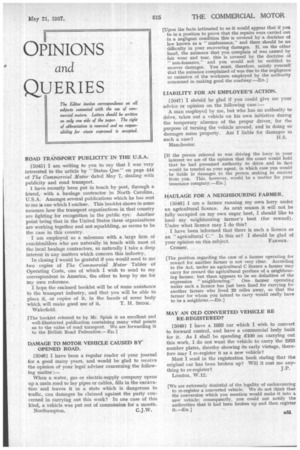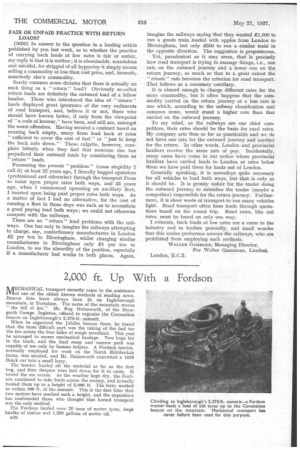OPINIONS
Page 65

Page 66

If you've noticed an error in this article please click here to report it so we can fix it.
and
QUERIES
ROAD TRANSPORT PUBLICITY IN THE U.S.A.
[50451 I am writing to you to say that I was very interested in the article by "Status Quo" on page 444 of The Commercial Motor dated May 7, dealing with publicity and road transport.
I have recently been put in touch by post, through a friend, with a haulage contractor in North Carolina, U.S.A. Amongst several publications which he has sent to me is one which I enclose. This booklet shows in some measure how the transport organizations in that country are fighting for recognition in the public eye. Another point being that in the United States these organizations are working together and not squabbling, as seems to be the case in this country.
I am employed as a salesman with a large firm of coa.chbuilders .who are naturally in touch with most of the local haulage contractors, so naturally [take a deep interest in any matters which concern this industry.
In closing I would be grateful if you would send to me two copies of The Commercial Motor Tables of Operating Costs, one of which I wish to send to my correspondent in America, the other to keep by me for my own reference.
I hope the enclosed booklet will be of some assistance to the transport industry, and that you will be able to place it, or copies of it, in the hands of some body which will make good use of it. T. H. SPINE. Wakefield.
[The booklet referred to by Mr. Spink is an excellent and well-illustrated publication containing many vital points as to the value of road transport. We are forwarding it to the British Road Federation.—En.]
DAMAGE TO MOTOR VEHICLE CAUSED BY" OPENED ROAD.
[50461 I have been a regular reader of your journal for a good many years, and would be glad to receive the opinion of your legal adviser concerning the following matter :— When a water, gas or electric-supply company opens up a main road to lay pipes or cables, fills in the excavation and leaves it in a state which is dangerous to traffic, can damages be claimed against the party concerned in carrying out this work? In one case of this kind, a vehicle was put out of commission for a month.
Northampton. C.J.W.
[Upon the facts intimated to us it would appear that if you be in a position to prove that the repairs were carried out in a negligent condition this is covered by a doctrine of law known as a " misfeasance," and there should be no • difficulty in your recovering damages. If, on the other hand, the nuisance that you complain of was caused by fair wear and tear, this is covered by the doctrine of "non-feasance," and you would not be entitled to recover damages. You must, therefore, satisfy yourself that the nuisance complained of was due to the negligence or omission of the workmen employed by the authority concerned in making good the roadway.—End
LIABILITY FOR AN EMPLOYEE'S ACTION.
[5047] .1 should be glad if you could give me your advice or opinion on the following case :—
A man employed by me, but who has no authority to drive, takeS out a vehicle on his own initiative during the temporary absence of the proper driver, for the purpose of turning the vehicle around, and in doing so damages some property. Am I liable for damages in such a case? H.S. Manchester.
[If the person referred to was driving the lorry in your interest we are of the opinion that the court would hold that he had presumed authority to drive and in fact would be treated as your agent, in which case you would . be liable in damages to the person seeking to recover from you. This, however, would be a matter for your insurance company.—End
HAULAGE FOR A NEIGHBOURING FARMER.
[5048] I am a farmer running my own lorry under an agricultural licence. As next season it will not be fully occupied on my own sugar beet, I should like to haul my neighbouring• farmer's beet (for reward). Under what licence may I do this?
I have been informed that there is such a licence as an "agricultural C." Is this so? I should be glad of your opinion on this subject. FARMER. Cromer.
[The position regarding the case of a farmer operating for reward for another farmer is not very clear. According to the Act, under an agricultural C licence a farmer may carry for reward the agricultural produce of a neighbouring farmer, but there appears to be no definition of the expression "neighbouring." One farmer operating under such a licence has just been fined for carrying for another farmer who lived 20 miles away, so that the farmer for whom you intend to carry would really have to be a neighbour.—End
MAY AN OLD CONVERTED VEHICLE BE RE-REGISTERED?
[5049] I have a 1933 car which I wish to convert to forward control, and have a commercial body built for it. As I shall be spending £100 on carrying out this work, I do not want the vehicle to carry the 1933 number plates, thereby showing its early vintage, therefore may I re-register it as a new vehicle?
Must I send in the registration book stating that the original car has been broken up? Will it cost me any
thing to re-register? J.PLondon, W.12.
[We are extremely doubtful of the legality of endeavouring to re-register a converted vehicle. We do not think that the conversion which you mention would make it into a new vehicle; consequently, you could not notify the authorities that it had been broken up and then register FAIR OR UNFAIR PRACTICE WITH RETURN LOADS?
(50501 In answer to the question in a leading article published by you last week, as to whether the practice of carrying back loads at low rates is fair or unfair, my reply is that it is neither ; it is abominable, scandalous and suicidal, for stripped of all hypocrisy it simply means selling a commodity at less than cost price, and, forsooth, somebody else's commodity.
Surely common sense dictates that there is acteAlly no such thing as a " return " load? Obviously so-called return loads are definitely the outward load of a fellow haulier. Those who introduced the idea of " return " loads displayed great ignorance of the very rudiments of road transport, and, believe it or not, those who should have known better, if only from the viewpoint of " a code of honour," have been, and still are, amongst the worst offenders. Having secured a contract based on running back empty, many firms load back at rates "sufficient to cover the cost of fuel" or "just to keep the back axle down." These culprits, however, complain bitterly when they find that someone else has prejudiced their outward loads by considering them as " return " loads.
Foreseeing the present " problem " (crass stupidity I call it) at least 25 years ago, I literally begged operators (professional and otherwise) through the transport Press to insist upon proper rates both ways, and 33 years ago, when I commenced operating an ancillary fleet, I insisted upon being paid proper rates both ways. As a matter of fact I had no alternative, for the cost of running a fleet in those days was such as to necessitate a good paying load both ways ; we could not otherwise compete with the railways.
There are no " return " load problems with the railways. One has only to imagine the railways attempting to charge, say, confectionery manufacturers in London E2 per ton to Birmingham, whilst charging similar manufacturers in Birmingham only El per ton to London, to see the absurdity of the position, especially if a manufacturer had works in both places. Again,
Imagine the railways saying that they wanted £1,000 to run a goods train loaded with apples from London to Birmingham, but only £500 to run a similar train in the opposite direction. The suggestion is preposterous.
Yet, paradoxical as it may seem, that is precisely how road transport is trying to manage things, i.e., one rate on the outward journey and a lower one on the return journey, so much so that to a great extent the " return " rate becomes the criterion for road transport. That follows as a necessary corollary.
It is absurd enough to charge different rates for the same commodity, but it often happens that the commodity carried on the return journey at a less rate is one which, according to the railway classification and common sense, would stand a higher rate than that carried on the outward journey.
To my mind, as the railways are our chief competitors, their rates should be the basis for road rates. My company acts thus so far as practicable and we do not have one rate for the outward journey and another for the return. In other words, London and provincial hauliers receive the same rate of pay. Incidentally, many cases have come to our notice where provincial hauliers have carried loads to London at rates below those we have paid them for loads out of London.
Generally speaking, it is nowadays quite necessary for all vehicles to load both ways, but that is only as it should be. It is grossly unfair for the trader doing the outward journey to subsidize the trader (maybe a competitor) responsible for the return journey. Furthermore, it is sheer waste of transport to run many vehicles light. Road transport often loses loads through quotations based on the round trip. Road rates, like rail rates, must be based on only one way.
I reiterate, back loads at low rates are a curse to the industry and to traders generally, and small wonder that this undue preference annoys the railways, who are prohibited from employing such methods.
WALTER GAMMONS, Managing Director,
For Walter Gammons, Limited. London, E.C.2.




































































































